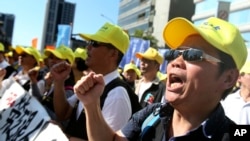A pro-independence group in Taiwan is calling for a referendum on a controversial topic, the drafting of a new constitution. The group, which was founded by former presidential adviser Koo Kwang-ming, a longtime advocate of Taiwan's independence, calls for the referendum to be held in August.
Beijing claims democratically ruled Taiwan is part of its territory and has already voiced its objection to the proposal, warning that such "separatist activities" were a "dead end."
The call for a new constitution was also met by a backlash online in China, and Taiwan's opposition Nationalist Party or Kuomintang also voiced its objection to any push toward independence.
According to Koo Kwang-ming's Taiwan New Constitution Foundation (TNC), the referendum has already gathered more than 3,000 signatures for the two proposals, surpassing the threshold of 1,931 required by law.
The group says the proposed referendum will ask voters two questions: "Do you support the president in initiating a constitutional reform process for Taiwan?" And "Do you support the president in pushing for the establishment of a new constitution that reflects the current realities of Taiwan?"
Time for change?
Lin Yi-cheng, the executive director of the Taiwan New Constitution Foundation, told VOA that after 30 years of democratization, it is time to resolve Taiwan’s national identity and shift its position on the world stage.
“Thirty years ago, only 13% of people regarded themselves as Taiwanese and non-Chinese. In 2020, that number has climbed to 83%,“ he said.
Lin noted that the current constitution of the Republic of China (Taiwan's official name), was adopted before Kuomintang leader Chiang Kai-shek fled China to Taiwan. The KMT lost a civil war to the Communist Party of China and relocated to Taiwan in 1949.
Drawn up in 1946, the constitution puts China and Taiwan under the jurisdiction of the Republic of China, while in reality the two sides have been separately ruled for more than 60 years, he said.
Under Taiwan’s Referendum Act, the process for holding a referendum involves three stages: a proposal, endorsement and voting.
The endorsement stage requires a minimum of 290,000 signatures in less than six months. And if the referendum is held, 50% turnout of qualified voters is required for the referendum to be valid. That means at least a quarter of the population (5 million voters) have to cast “yes” votes for the referendum to be adopted.
Strong response
The proposals have attracted a strong response from China’s Taiwan Affairs Office.
Taiwan Affairs Office spokeswoman Zhu Fenglian called efforts to push for “Taiwan independence” a historical backflow and a dead end.
“The separatist activities will only push Taiwan into an extremely dangerous abyss and bring profound disaster to the vast number of Taiwan people,” Zhu said.
On China's tightly controlled social media networks netizens left threatening messages, with some urging China to use the opportunity to take military action.
One said: "This is forcing us to unite the country by force!" Another read: “I hope they can push for the referendum so we have a reason to accelerate the unification process.”
In Taiwan, the opposition KMT voiced its objections as well. A spokesperson for the party told VOA that while the party respects the public's right to hold referendums, on the issue of establishing a new constitution, it has long supported the peaceful development of relations with China and opposition to Taiwan independence.
Request for respect
Taiwan's Mainland Affairs Council issued a written statement, pointing out that “the referendum is a manifestation of the political rights and direct public opinion that Taiwan citizens deserve,” and urged Communist authorities in China to respect such rights.
Wong Ming-hsien, an international relations professor with Taiwan’s Tamkang University, told VOA that since President Tsai Ing-wen emphasizes maintaining the status quo of the cross-strait relations, it’s unlikely that she will publicly support the hardline camp move.
In addition, Wong said, the majority of Taiwan people do not want to trigger a war with China, which will likely reduce the momentum for the constitutional referendum.




